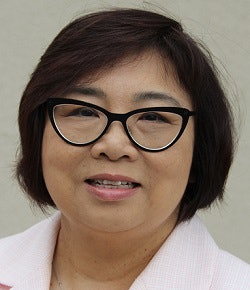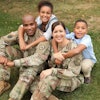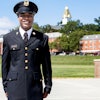Over the past few years, colleges and universities around the country have seen a marked increase in students who want to be equipped to serve military veterans. Some are veterans themselves, some have personal connections and others may have taken a course that sparked an interest in pursuing careers in veteran services.
 Dr. Frances W. Siu
Dr. Frances W. SiuListening to the career goals of their students as well as receiving input from campus veterans’ centers, institutions are developing programs that identify significant issues veterans and other military-connected individuals face and are building programs that equip students to fill positions that serve the needs of today’s veteran population.
Dr. Frances W. Siu, associate professor in the Charter College of Education at California State University, Los Angeles, has frequently worked with Manuel Martinez, director of the East Los Angeles Veterans Center, and observed his course “Boots to Books”
“The whole idea was helping veterans transition from military to civilian life,” says Siu, whose research interests include transitional issues of veterans. She and Martinez worked together to tweak the curriculum so that it could be offered both to veterans and those who want to work with veterans, such as counselors.
Developing that course subsequently led to Cal State LA’s Certificate in Veteran Services, which was first offered to students in fall 2016. It is an undergraduate program (graduate students are welcomed) designed for matriculating students in rehabilitation services, social sciences and human services as well as professionals interested in working with the veteran population.
“We saw the need there and we established this certificate,” says Siu, the program director. “’Boots to Books’ is the major course we have to make sure the students are being trained as far as how to [assist in] the transition.”
State University of New York Empire State College established its graduate certificate in veteran’s services in 2010. The primary impetus was a growing need for academic programs that would educate students in human service areas that pertained to veterans. The 12-credit program is taught online. At any given time, there are typically six to 10 students enrolled. The current program coordinator Dr. Lynette Nickleberry comes to the program with an extensive background, researching military culture and female soldiers and veterans.
“Since I’ve come on [in January 2018], we’ve actually been reevaluating some of the courses, and the Office of Veteran and Military Education has been consulted in terms of student need and curricular topics to make sure we are on the right track with regard [to] the learning goals and opportunities that are included in the coursework,” says Nickleberry.
“I have students who want to be social workers,” Siu says. “I have quite a few that work for the Veterans Administration. Many of them know of the nonprofits that are established to support veterans and they’ll work for those agencies.” She adds that graduates from prior to 2016 have requested readmission to earn the certificate.
Course content and research
The required courses for SUNY Empire State’s graduate certificate are Veteran Services and Public Policy, Veteran Outreach, Services and Advocacy, Veteran Programs and Benefits and Military Veteran Culture: Developing Cultural Competency. Students must go through the full admission process, but need not take other courses outside of the certificate program. Many of the course instructors are veterans or have significant experience dealing with the military, which Nickleberry says is crucial to communicating the nuances of the material.
 Dr. David E. Boezlner
Dr. David E. Boezlner“Our students are often in jobs that work in and around veterans service and they’re looking to supplement their knowledge and refine their skills,” says Nickleberry, an assistant professor in human services and human development.
“We train our students to go out there to work with people with disabilities, veterans, violence survivors,” says Siu, who also serves on the U.S. Veterans Affairs vocational rehab advisory board.
The Cal State LA certificate program is 18 units (six courses), all of which are on-campus classes. There are typically 40 students enrolled each semester. The required courses in addition to Boots to Books are Introduction to Rehabilitation Services, Introduction to Individual and Group Counseling, Introduction to Mental Health for Counselors and Trauma and Crisis Counseling. Electives are Disability and Function, Career Assessment and Development and Job Development and Placement.
“I want to make sure that the instructors have enough time to interact and spend one-on-one time with the students as much as possible,” Siu says. “We’re thinking of expanding this or helping other colleges and universities to at least offer the Boots to Books course.”
“Boots to Books” includes discussion of the differences between military and civilian life and salient points that veterans face. There is discussion on veteran suicide rates and the professor addresses intervention and prevention.
There will be a self-study next year and students and alumni will be asked how they applied the program to their work lives and how the program increased employability.
Nickleberry has done research on military families and active duty women. Her current research project examines the lives of African-American women in the military and how they negotiate their identities as they move through the ranks.
“One of the revisions that we’re doing across the courses is to integrate more information on diverse populations, including women, women’s issues, family adjustment issues and work/family balance,” says Nickleberry. “In the military it means something very different because families are so integrated into the military structure.”
“We address issues such as sexual harassment and sexual assault,” she continues. “We look at veteran services that are unique for women, some of the challenges they face in accessing services and some of the policies that influence them in particular. As we move through revising all of the courses this year, we are making sure those issues are addressed.”
 Dr. Lynette Nickleberry
Dr. Lynette NickleberryAdvocacy
William and Mary Law School has had the Lewis B. Puller, Jr. Veterans Benefits Clinic since 2008. Law students work with veterans on legal issues largely related to benefits claims.
Seeing a need to create more informed advocates on veterans’ issues, faculty of the clinic developed the Online Certificate in Military and Veterans Health, Policy and Advocacy, which launched in August 2017. To earn the certificate, enrollees must successfully complete four courses: Veterans Disability Benefits, Legal Research and Writing for Advocacy, Application of Techniques for Military and Veteran Advocacy and Psychological Challenges and Resulting Legal Issues for Service Members and Veterans.
Certificate students come from outside the law school and need not have any connection to William and Mary. The four eight-week online courses start every two months. There have been as many as 12 students at any given time. The courses are not state-specific and no matter where in the U.S. someone is located, he or she can gain useful knowledge in their advocacy for veterans.
David E. Boezlner, co-director of the Puller Clinic, worked with colleagues to develop the certificate courses. The clinic handles numerous cases of Post Traumatic Stress Disorder and Military Sexual Trauma, and that is reflected in one of the courses. The ability to assemble and write benefits claims is essential.
“Our thought was that folks who work for [veterans’] organizations who help veterans with claims to get benefits from the VA might be interested in getting training that will enable them to be more effective,” says Boezlner. “The thought was to educate folks and train them to pull together the evidence in the way that lawyers know how to do and present it in these claims.”
This article appeared in the May 31 issue of Diverse magazine.















